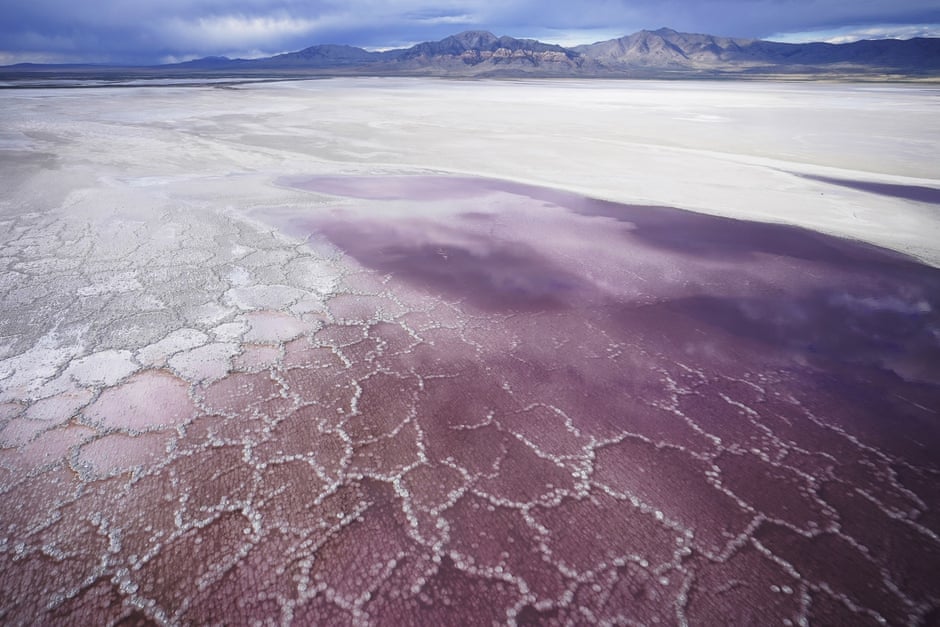Pink water washes over a salt crust on May 4, 2021, along the receding edge of the Great Salt Lake. The lake has been shrinking for years, and a drought gripping the American West could make this year the worst yet. (AP Photo/Rick Bowmer)
WASHINGTON, D.C. – In a rush prior to adjourning for the August congressional recess, the U.S. House of Representative passed the Saline Lake Ecosystem in the Great Basin States Program Act on July 29.

Jointly introduced by Congressmen Blake Moore (R-UT) and Jared Huffman (D-CA), this measure would provide the U.S. Geological Survey – in coordination with the U.S. Fish and Wildlife Service and tribal, state, academic and non-profit organizations – with resources to conduct scientific monitoring and assessments to establish effective management and conservation efforts to preserve essential Saline Lake habitats with the Great Basin network.
The proposed legislation drew praise from Utah Gov. Spencer Cox.
“It perfectly compliments our work with the Utah Legislature to make historic changes to state water law and dedicate hundreds of millions of dollars to save the Great Salt Lake and improve water conservation throughout Utah,” the governor explained.
Saline lakes with the Great Basin region – which includes areas of Utah, California, Nevada and Oregon – provide a critical network of habitats for millions of migrating shorebirds, waterbirds and waterfowl.
Saline lakes generally have higher levels of salt and dissolved minerals than freshwater lakes, allowing them to provide essential habitats, recreational opportunities and public health benefits.
But declining water levels due to demand, drought and environmental changes have dried out these important lakes within the Great Basin, threatening economies, habitats, public health and recreation.
“This legislation is an important step forward in understanding and protecting the Great Salt Lake,” according to Joel Ferry, the new executive director of the Utah Department of Natural Resources.
“We are experiencing the worst drought in the West in generations and the Great Salt Lake has hit historic low levels,” Ferry added. “We need to take action to protect and mitigate these impacts.”
“Utah’s Great Salt Lake and its neighboring saline lakes are invaluable to our health, environment and habitats,” Moore explained. “They also impact our ski, recreation, brine shrimp and extraction industries.
“I am thrilled this bill moved through the House Natural Resources Committee with unanimous support and passed the House as a testament to our commitment to preserve our saline lake ecosystems so our water users, industries and animals can thrive for years to come.”
Identical companion legislation – Senate Bill 1466 – introduced by Sen. Mitt Romney (R-UT) passed the Senate on July 28. That proposal would also help to inform Utah and neighboring states about what is happening at these Western saline lakes and what actions could help conserve them for generations to come.
“Finding solutions to the water challenges facing Great Salt Lake and the West cannot be a zero sum game,” Ferry emphasized. “We are all in this together.”
Both House Resolution 5345 (Moore’s proposed legislation) and Senate Bill 1466 (Romney’s bill) enjoy broad bipartisan support.
Non-profit organizations supporting those bills include the National Audubon Society, Compass Minerals, Trout Unlimited, Rio Tinto Kennecott, the Utah Waterfowl Association, The Utah Airboat Association, the Utah Wetlands Foundation, the Nature Conservancy in Utah, Friends of the Great Salt Lake, the Weber Basin Water Conservancy District, the Great Salt Lake Brine Shrimp Cooperative, the Utah Audubon Council and the National Wildlife Federation.

